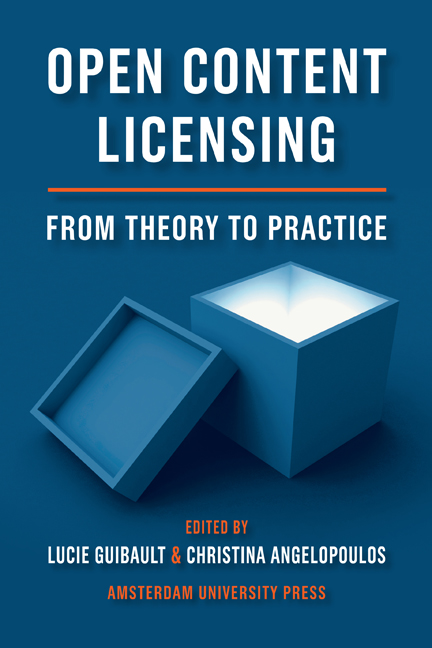Book contents
- Frontmatter
- Contents
- 1 Open Content Licensing: From Theory to Practice – An Introduction
- 2 Towards a New Social Contract: Free-Licensing into the Knowledge Commons
- 3 Is Open Content a Victim of its Own Success? Some Economic Thoughts on the Standardization of Licenses
- 4 (Re)introducing Formalities in Copyright as a Strategy for the Public Domain
- 5 User-Related Assets and Drawbacks of Open Content Licensing
- 6 Owning the Right to Open Up Access to Scientific Publications
- 7 Friends or Foes? Creative Commons, Freedom of Information Law and the European Union Framework for Reuse of Public Sector Information
- 8 Contributing to Conversational Copyright: Creative Commons Licenses and Cultural Heritage Institutions
- 9 Creative Commons and Related Rights in Sound Recordings: Are the Two Systems Compatible?
5 - User-Related Assets and Drawbacks of Open Content Licensing
Published online by Cambridge University Press: 22 January 2021
- Frontmatter
- Contents
- 1 Open Content Licensing: From Theory to Practice – An Introduction
- 2 Towards a New Social Contract: Free-Licensing into the Knowledge Commons
- 3 Is Open Content a Victim of its Own Success? Some Economic Thoughts on the Standardization of Licenses
- 4 (Re)introducing Formalities in Copyright as a Strategy for the Public Domain
- 5 User-Related Assets and Drawbacks of Open Content Licensing
- 6 Owning the Right to Open Up Access to Scientific Publications
- 7 Friends or Foes? Creative Commons, Freedom of Information Law and the European Union Framework for Reuse of Public Sector Information
- 8 Contributing to Conversational Copyright: Creative Commons Licenses and Cultural Heritage Institutions
- 9 Creative Commons and Related Rights in Sound Recordings: Are the Two Systems Compatible?
Summary
Introduction
Discussions about open content from the user's perspective focus mostly on the gratuitous use of material protected by copyright. It is a marvellous system for consumers whose demands are best served thus: they will not be charged for a product that usually can only be acquired for money.
Clearly, such a statement is oversimplified – at best diffuse, maybe even plain wrong. There is much more to open content and open access – even from the users’ point of view – than sparing the consumer costs. Examining the approach of open licensing systems more closely reveals that saving costs does not even appear to be one of their principles. Moreover, the benefit of accessing works for free is only one aspect among many others that concern users’ interests. When examining the implications of open content for the user, many additional advantages and problems are worth mentioning. The following thoughts illustrate that the issue requires a differentiated analysis. When it comes to complexities and potential problems connected with open content licensing, it is necessary to define the term ‘user’ more precisely. Most of these issues will only affect a certain group of users rather than ‘the user’ in any generic sense of the word. Thinking about a user typology is a basic requirement for understanding the particular user-related benefits and drawbacks of open content.
In Section 2 of this chapter I will briefly address some of the principles of open content and its history. In Section 3 I will describe the relationship between open content licensing and copyright law, while in Section 4 the user's rights in copyright law and in open content licenses will be compared. Section 5 deals with some of the user–related pros of open content licensing and Section 6 with some of the challenges the users of open content have to deal with.
The Basics I: Fundamentals and Principles of Open Content licensing
In the Beginning Stallman Created the GNU and the FSF
According to Lessig, one of the founders of the ‘Creative Commons’ licensing system, the basic concept behind the Creative Commons licenses was ‘stolen from the Free Software Foundation’ (FSF).
- Type
- Chapter
- Information
- Open Content LicensingFrom Theory to Practice, pp. 107 - 136Publisher: Amsterdam University PressPrint publication year: 2012
- 1
- Cited by



